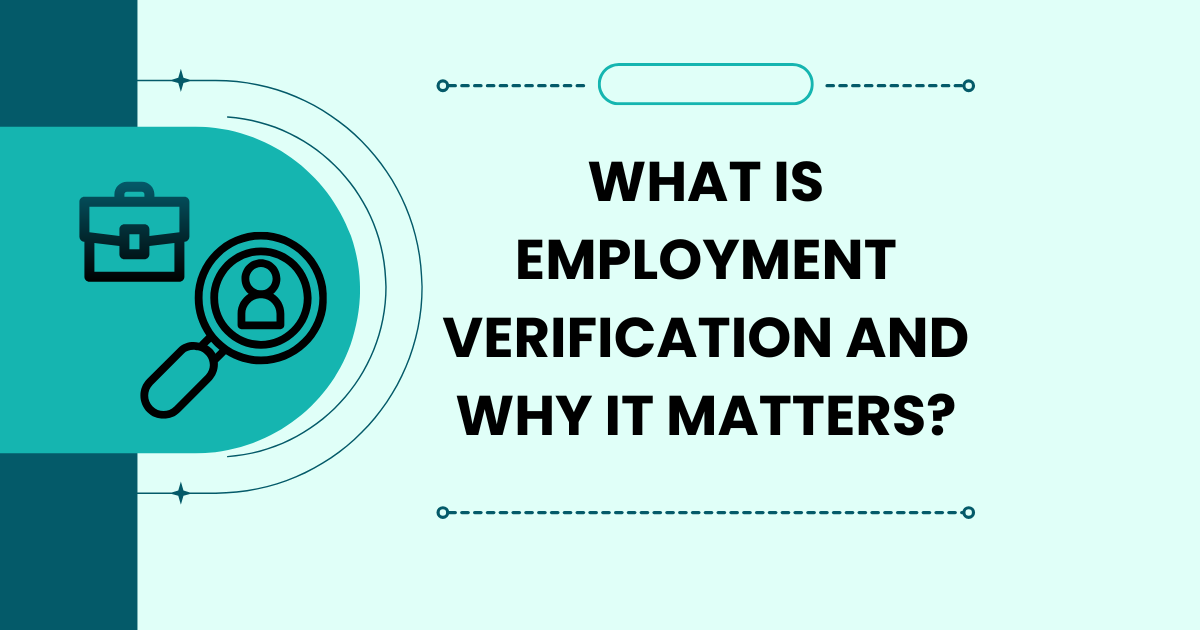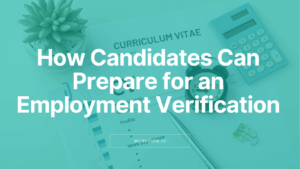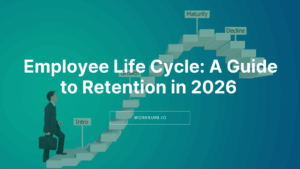Employment verification is one of the most underestimated yet essential steps in any decision-making process involving people. Whether you’re hiring a new employee, processing a visa application, or approving a loan, verifying someone’s work history protects your organization from costly mistakes.
In fact, while over 90% of employers conduct employment verifications, many treat it as a routine formality, missing the opportunity to use it as a tool for trust, compliance, and informed decision-making.
Given the rise in misrepresented job titles and exaggerated experience, it’s no longer enough to simply take resumes at face value. Verifying these claims is now a necessary step before making key decisions.
So how do you approach the process in a way that’s reliable, compliant, and efficient?
That’s exactly what we’ll cover in this guide.
Table of Contents
What Is Employment Verification?
Employment verification is the process of confirming a candidate’s current or past job experience. It typically involves verifying details such as job titles, duration of employment, salary (in some cases), and reasons for leaving.
Employers may contact former workplaces, request official experience letters, or use third-party platforms like WorkSure to conduct this check securely and efficiently.
Employment verification serves as a bridge between what’s stated on a resume and what’s been officially recorded. It’s a safeguard that ensures accuracy and honesty in the hiring process.
Why Is Employment Verification Important?
Employment verification is a key step in creating a transparent, trustworthy hiring process. Here’s why it matters to both employers and candidates:

How Employment Verification Benefits Employers
Employment verification plays a critical role in the hiring process by helping employers make informed, strategic decisions. Here’s a deeper look at why employment verification is essential for employers:
1. Reduces Hiring Risk
According to a CareerBuilder survey, 58% of hiring managers have identified inconsistencies or embellishments in candidate resumes. These often include overstated job titles, expanded responsibilities, or misaligned employment dates.
Employment verification helps HR teams confirm that candidates genuinely possess the experience they claim. Thus, it reduces the likelihood of hiring someone unqualified or deceptive.
2. Protects Organizational Reputation
Every employee becomes a brand ambassador—internally and externally. A poor hiring choice, especially in client-facing or leadership roles, can affect your company’s image. Employment verification acts as a filter, helping ensure that each hire reflects your company’s standards and values.
3. Ensures Role Readiness
Hiring someone with the wrong skillset can lead to decreased team productivity and increased turnover. By verifying a candidate’s prior roles and responsibilities, employers can ensure that new hires have the capabilities needed to meet performance expectations from day one.
4. Supports Compliance with Legal and Industry Standards
For many regulated industries such as healthcare, finance, and government, employment verification is not just a best practice but a legal requirement. Failing to perform proper checks may result in compliance breaches or failed audits.
Verifying employment history demonstrates adherence to both internal hiring policies and external regulatory standards.
5. Enhances Hiring Efficiency and Confidence
Verified employment data helps recruiters and hiring managers make decisions faster and with greater certainty. In high-volume hiring environments, automated verification systems can reduce manual workload while maintaining high standards of accuracy and reliability.
6. Builds Trust in HR and Recruitment Processes
When hiring decisions are based on verified data, internal confidence in HR processes increases. It also protects the company in the event of post-hire disputes or background check audits.
When verification is handled correctly, it accelerates hiring decisions while maintaining quality and due diligence. Platforms like WorkSure simplify and accelerate employment verification by letting employers confirm job titles, tenure, and work history.

How Employment Verification Benefits Job Seekers
Employment verification also works in favor of candidates, especially in competitive and compliance-heavy industries. Here’s how job seekers benefit:
1. Builds Professional Credibility
When an employer can easily verify your job history, it positions you as a trustworthy, transparent candidate. This reassures recruiters that your experience is legitimate and makes your application stronger.
2. Speeds Up the Hiring Process
Candidates with verified experience or readily available documentation tend to move through hiring pipelines more quickly. When references, employment letters, and dates align without issues, employers are more confident advancing your application.
3. Helps with Visa, Housing, and Financial Applications
Employment verification isn’t just for jobs. If you’re applying for a visa, renting an apartment, or applying for a loan, verified employment details make those processes smoother and faster.
4. Reflects Your Preparedness
Having your verification documents ready, like experience letters, pay slips, or tax forms, shows you’re proactive and organized. It’s a signal to employers that you value professionalism and are ready to move forward.

Who Conducts Employment Verification?
Employment verification is conducted in various ways depending on the organization’s resources, urgency, and available tools. The three most common methods are
1. In-House HR Teams
In many organizations, HR departments take on the responsibility of verifying a candidate’s previous employment. This typically involves
- Contacting former employers by phone or email
- Requesting confirmation of job titles, dates of employment, and, in some cases, the reason for departure
- Manually managing responses and following up where needed
Although this method allows employers to retain control, it can be time-consuming, inconsistent, and dependent on the responsiveness of the contacted company. Many employers also follow restrictive disclosure policies, limiting what they can confirm.
2. Third-Party Background Check Providers
External background screening agencies, such as HireRight or Checkr, offer employment verification as part of a broader suite of services. These checks often include:
- Employment and education history
- Criminal background
- Credit reports (in some industries)
- Identity verification
While comprehensive, these services can be expensive, especially for small and medium-sized businesses. Turnaround times vary and can be delayed when verifying international or hard-to-reach employers.
3. Employment Verification Platforms
Some organizations use dedicated platforms like WorkSure to manage employment verifications more efficiently. These platforms are designed to reduce the manual effort involved in reaching out to past employers and maintaining internal records.
WorkSure allows employers to
- Send verification requests directly to other companies.
- Confirm or deny previous employment claims.
- View feedback or flags related to the employee’s record.
No matter which method you choose, conducting employment verification within legal boundaries is essential. Let’s look at what that involves.
Legal Considerations in Employment Verification
Employment verification must be conducted in compliance with legal frameworks that protect both employers and candidates. One of the most important legal aspects is consent. Most regions require written authorization from the employee before an employer can disclose information beyond basic employment data.
For example, under the Fair Credit Reporting Act (FCRA) in the U.S., employers must inform candidates and obtain written consent before conducting third-party checks. Failing to do so can result in legal penalties and reputational damage.
In addition to consent, data privacy laws regulate what can be shared and how. For example, salary history or reasons for termination often cannot be disclosed without explicit permission. Companies also have their own internal disclosure policies, which may further restrict the type of information that can be released.
To stay compliant and avoid legal risks, employers often use secure platforms like WorkSure that ensure sensitive data is handled appropriately and only shared with authorized parties.
Final Thoughts
Employment verification is a key component of responsible hiring and career progression. For employers, it reduces hiring risks, ensures compliance, and builds a reliable, high-performing workforce. For candidates, it reinforces credibility, speeds up the hiring journey, and opens doors beyond job applications, from visa approvals to rental agreements.
As hiring practices evolve, so should the tools we use. Platforms like WorkSure are making it easier, faster, and more secure to verify employment records, ensuring everyone starts from a place of transparency.
Explore WorkSure today and make trust your first hire.
Frequently Asked Questions (FAQs)
What information can be released for employment verification?
Employers can typically disclose basic information such as job title, start and end dates, and current employment status. With the employee’s written consent, they may also provide salary details, responsibilities, and reasons for leaving. However, laws and company policies may limit what can be shared without consent.
What are employment verification documents?
These are official records that prove a person’s current or past employment. Common examples include job offer letters, pay slips, tax forms, employment contracts, or HR-issued verification letters. These documents are often required when applying for loans, visas, apartments, or new jobs.
What is an employment verification letter?
It’s a formal document issued by an employer or HR department that confirms a person’s employment. It typically includes the employee’s name, job title, department, dates of employment, and sometimes salary. This letter is often used for immigration, housing, or loan applications.
Why is employment verification required for apartment rentals?
When applying for an apartment, landlords or property managers often request proof of employment to ensure the applicant has a stable income. This helps them assess the tenant’s ability to pay rent consistently. The verification can come through a letter from the employer or pay stubs.
Why would someone call for employment verification?
Employers, landlords, lenders, or government agencies may call to verify a person’s employment details to confirm eligibility for a job, housing, credit, or legal processes.
What questions are typically asked during employment verification?
Typical questions include:
- Is the individual currently employed with your company?
- What is/was their job title and role?
- What were their start and end dates?
- Are they a full-time or part-time employee?
- What is their current or last known salary (if permitted)?





